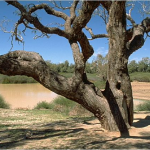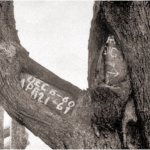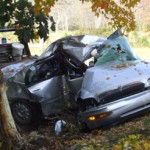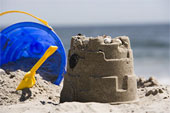Deuteronomy 4_1-9 Tragic confusion
Â
 This is the tree on the banks of the Cooper Creek that Burke and Wills saw when they arrived, near death, after a journey of discovery to the top of Cape York.
This is the tree on the banks of the Cooper Creek that Burke and Wills saw when they arrived, near death, after a journey of discovery to the top of Cape York.
Â
 This is the ‘life saving’ inscription carved into the tree, telling Burke and Wills where to dig to fine food and provisions.
This is the ‘life saving’ inscription carved into the tree, telling Burke and Wills where to dig to fine food and provisions.
Â
What happened? Why didn’t the life saving message not save the life of Burke and Wills? Yes. They misunderstood the meaning of the writing, dug in the wrong spot, never found the provisions and so died. By digging in the wrong spot, they never received the gift of life that was left for them.Â
Can there be such confusion about God’s word to us? Could we get God’s life saving word so wrong that we fail to find the real treasure of God’s gift to us and die? I would argue yes! And what is our confusion? Its the mixing of Law and Gospel; a confusing of God’s commands with God’s blessing. We are digging for life in the law, in our obedience to Jesus’ commands, when the actual treasure is only found in the gospel, in receiving rather than in doing.Â
The Law, the 10 commandments and other statutes, were revealed by God on Mount Sinai to Moses and the people of Israel. These commands were written on stone tablets as a testimony and covenant pointing to how our life with God needs to be. Like the writing on the dig tree, that said what needed to happen in order to find the hidden treasure. The law pointed out what needed to happen to find the treasure of being God’s people. It laid out how to live in the presence of God himself and receive from him the blessings of the Promised Land, flowing with milk and honey.
Just before the people entered the Promised Land, Moses gathered them together and re-read the Law to the people, reminding them that the Law of God intended to bring life and blessing. ‘Hear now, O Israel, the decrees and laws I am about to teach you. Follow them so that you may live and may go in and take possession of the land that the LORD, the God of your fathers, is giving you.’… ‘what other nation is so great as to have such righteous decrees and laws as this body of laws I am setting before you today?’
The Law, the 10 Commandments brought life with God because they showed the Israelites and now show us how God intends us to live. Its like God is saying ‘I created you to be in my image, and these commandments are righteous because they reflect that image. Live up to them, obey them with all your heart and all your soul and all your mind and you will live. Don’t and you will die.’Â
Silently now for a moment, in your heart, are you thinking ‘yes, I must try harder and live up to God’s Commandments, or else I will also die?’
This is our first fatal confusion about God’s word. We miss-read, confuse or fail to understand the intended function God has for his law. In the same way as the Pharisees did, we think that if we try hard enough and have enough successes in keeping the law as God intended, we will live and be blessed by him. Surely this is what the Pharisees were thinking when the questioned Jesus ‘So the Pharisees and teachers of the law asked Jesus, “Why don’t your disciples live according to the tradition of the elders instead of eating their food with ‘unclean’ hands?”Â
They, like us confuse the intention of God’s law; ‘we dig’ for life in the wrong place, like Burke and Wills. No, there is no life with God or blessing from him by trying to keep his law. We can’t, as St Paul warns in chapter three of Romans ‘Jews and Gentiles alike are all under sin. “There is no one righteous, not even one; there is no one who understands, no one who seeks God. All have turned away, they have together become worthless; there is no one who does good, not even one.’Â
The proper understanding of the Law, the purpose of the law, for the Jews, and for us Christians, is to reveal our sin. God set his Law in place to show us who we really are on the inside…sinners who break the law and that we are not the people God intended us to be.
If we think we are pleasing God by obeying the law, following every command, even those Jesus calls us to do. And if we think that if we point out and correct others who don’t keep every command, like the Pharisees, and are certain God is pleased with us for doing this…let us hear what Jesus has to say ‘Isaiah was right when he prophesied about you hypocrites; as it is written: “‘These people honor me with their lips, but their hearts are far from me.’ All we are doing by outwardly keeping the law in order to please God, is masking our sin in good works; papier-mâchéing over the sin inside that God intends to reveal. We are confusing the law into gospel. Luther says in his commentary on Galatians ‘The principle purpose of the law in theology is to make a [person] not better but worse.’
Why is the Law life if we are made worse? Why is it righteous? Because it reveals our sin so God can deal with it. Most importantly, the law points us to Jesus, the hidden treasure, who fulfilled the law for us. The function of the 10 Commandments is to point us away from our righteousness and point us to the righteousness of Jesus.  It says ‘dig here’ and receive the righteousness of God.  If we don’t clearly understand this, we will be like Burke and Wills and perish looking for our righteousness in the wrong place.
Life with God or our righteousness is found only in our treasure Jesus, who ‘was pierced for our transgressions, was crushed for our iniquities… and by his wounds we are healed.’ We are given the gift and blessing of forgiveness and eternal life only by trusting Jesus at his word. Trusting that if by faith we ‘dig here’ in Jesus, we will receive the hidden treasure of life, because Jesus promised clearly in John 11 “I am the resurrection and the life. He who believes in me will live, even though he dies; and whoever lives and believes in me will never die.â€Â Â
As loud as the law condemns us, even louder the gospel saves us. It illuminates our hearts and makes us alive. It discloses what grace and the mercy of God are; what the forgiveness of sins, blessing, righteousness, life, and eternal salvation are; and how we are to attain to these. (Luther; Galatians -1535, pg 313)
The gospel of Jesus that we hear and receive from the bible and in the sacrament of baptism and Holy Communion, is like finding the hidden provisions under the sand near the dig tree. Its like reading and understanding what was written on the Coolabah tree and receiving life out of the hidden parcel of food; we eat and drink salvation!
Sadly…this is where our second fatal confusion over God’s word happens. This good news, the gospel, seems too good to be true and so we place the gospel of Jesus, the free gift of forgiveness and life for his sake, back under the law. We add conditions upon grace as if some sorts of requirements are needed. Once our heart takes hold of Jesus and we receive life, instead of trusting and leaving it at that, we feel we need some works to help our doubting conscience. ‘I must improve my ways’; ‘I must commit myself to mission; ‘I must do this or that in order to be certain I am saved’.
Put a condition on grace and you have a law. There are no conditions, which means we cannot judge who is a Christian or not, or who is saved or not by what they do, how they dress or how committed they may seem. Yes, that grinds in our ears and doesn’t seem right, but as Jesus said to the man who worked the longest in the parable of the vineyard ‘Take your pay and go. I want to give the man who was hired last the same as I gave you. Don’t I have the right to do what I want with my own money? Or are you envious because I am generous?’
When we do not confuse the law with the gospel, then we have found the hidden treasure of life. Had Burke and wills found the hidden provisions, they would have lived and been forever grateful. When we receive the free gift of forgiveness from God, we are also forever grateful. The gospel empowers us to love God and love others freely.   Only the gospel can do this, because the gospel is the power of God for the salvation of everyone who believes:’   Amen
 Did you realize that every time you get into a modern motor car, you are putting on an armoury of protection? Many of us take this for granted, and don’t understand and even despise all the lights, beeps and warning tones that go off in our car, every time we turn the key. We take little notice of what is happening around us as we click on our seat belt and drive out onto the road. But did you realize the car has now provided an armour, a safety cell for us, that protects us against impacts from outside.
Did you realize that every time you get into a modern motor car, you are putting on an armoury of protection? Many of us take this for granted, and don’t understand and even despise all the lights, beeps and warning tones that go off in our car, every time we turn the key. We take little notice of what is happening around us as we click on our seat belt and drive out onto the road. But did you realize the car has now provided an armour, a safety cell for us, that protects us against impacts from outside. mechanic? Did I just pick up this book, put on a pair of overalls, tuck the book under my arm, and walk into a garage? No, of course not! What makes a mechanic a mechanic?  For someone to be a motor mechanic, they have to be totally involved in the job; working on cars, studying how they work, pulling engines and gearboxes apart and …hopefully, putting them back together again. By actually doing the job you grow in knowledge, confidence and ability and before long, you become what you do…a mechanic. Â
mechanic? Did I just pick up this book, put on a pair of overalls, tuck the book under my arm, and walk into a garage? No, of course not! What makes a mechanic a mechanic?  For someone to be a motor mechanic, they have to be totally involved in the job; working on cars, studying how they work, pulling engines and gearboxes apart and …hopefully, putting them back together again. By actually doing the job you grow in knowledge, confidence and ability and before long, you become what you do…a mechanic.  